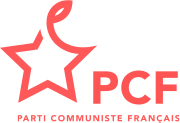Our website is made possible by displaying online advertisements to our visitors.
Please consider supporting us by disabling your ad blocker.
French Communist Party
| Part of a series on |
| Communist parties |
|---|
The French Communist Party (French: Parti communiste français, pronounced [paʁti kɔmynist fʁɑ̃sɛ], PCF) is a communist party in France. The PCF is a member of the Party of the European Left, and its MEPs sit with The Left in the European Parliament – GUE/NGL group.
The PCF was founded in 1920 by Marxist–Leninist members of the French Section of the Workers' International (SFIO) who supported the Bolsheviks in the 1917 Russian Revolution. It became a member of the Communist International, and followed a Marxist-Leninist line under the leadership of Maurice Thorez. In response to the threat of fascism, the PCF joined the socialist Popular Front which won the 1936 election, but it did not participate in government. During World War II, it was outlawed by the occupying Germans and became a key element of the Resistance. The PCF participated in the provisional government of the Liberation from 1944 to 1947, but for the next 30 years was excluded from government despite consistently winning more than 20 percent of the vote in elections. It fell behind the Socialist Party in the 1970s, though entered government early in François Mitterrand's presidency (1981–1984) and participated in the Plural Left cabinet led by Lionel Jospin (1997–2002).
From 2009, the PCF was a leading member of the Left Front (Front de gauche), alongside Jean-Luc Mélenchon's Left Party (PG). During the 2017 presidential election, the PCF supported Mélenchon's candidature; however, tensions between the PCF and Mélenchon's movement, La France Insoumise, have led the two parties to campaign separately for the general elections.[11] Although its electoral support has declined in recent decades, the PCF retains a strong influence in French politics, especially at the local level. In 2012, the PCF claimed to have had 138,000 members, 70,000 of whom had paid their membership fees.[12]
- ^ "Les secteurs et commissions du PCF". Site Internet du PCF (in French). 1 August 2018. Retrieved 22 January 2025.
- ^ @PCF (29 January 2023). "Congrès du PCF: le texte d'orientation du Conseil national porté par @Fabien_Roussel est adopté à 81,92% à l'issue du vote des communistes" (Tweet) – via Twitter.
- ^ Nordsieck, Wolfram (2017). "France". Parties and Elections in Europe.
- ^ "Latest Polling Data and election polls for Parti communiste français". PolitPro. Retrieved 1 December 2024.
- ^ "EuropeElects". Parties and Elections in Europe., citing data from Chapel Hill Expert Survey
- ^ Qvortrup, Matt (2022). Referendums and Ethnic Conflict (2nd ed.). University of Pennsylvania Press. p. 131. ISBN 9780812298581.
Further, France is a country with a persistent Euroskeptic party with coalition potential, namely the French Communist Party.
- ^ "Enver Hoxha: 'Eurocommunism' is Anti-Communism - pt. 1".
The French revisionist leaders proposed to their 23rd Congress, held in May 1979, that they should give up referring to Marxism-Leninism in the documents of their party and use the term "scientific socialism" instead.
- ^ Murray, Rainbow (2008). "The Power of Sex and Incumbency: A Longitudinal Study of Electoral Performance in France". Party Politics. 14 (5). SAGE: 551. doi:10.1177/1354068807088122. S2CID 144957277.
- ^ Mendras, Henri; Cole, Alistair (1991). Social Change in Modern France: Towards a Cultural Anthropology of the Fifth Republic. Cambridge University Press. p. 76. ISBN 052139998X.
- ^ Cosseron, Serge (ed.). Le dictionnaire de l'extrême gauche.
- ^ "Législatives : la tension monte d’un cran entre PCF et France insoumise", L'Humanité.
- ^ "Les primaires à gauche au banc d'essai" L'Express.
Previous Page Next Page
Parti communiste français ALS Parti Communiste Français AN الحزب الشيوعي الفرنسي Arabic الحزب الشيوعى الفرنساوى ARZ Partíu Comunista Francés AST Fransa Kommunist Partiyası AZ Французская камуністычная партыя BE Френска комунистическа партия Bulgarian Strollad Komunour Gall BR Partit Comunista Francès Catalan



